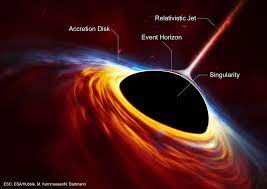Black holes and their effects on surrounding matter.
Black holes are one of the most fascinating and mysterious objects in the universe. They are regions in space where the gravitational pull is so strong that nothing, not even light, can escape their grasp. While black holes themselves do not emit any radiation, their effects on the surrounding matter can be quite dramatic.
When matter falls towards a black hole, it forms an accretion disk around it. The intense gravity of the black hole causes the material in the accretion disk to heat up and emit radiation. This radiation can be observed by astronomers and is one way to detect the presence of a black hole.
As matter falls into the black hole, it also causes the release of enormous amounts of energy in the form of jets of high-energy particles. These jets can extend for millions of light-years, and their impact on the surrounding matter can be profound.
One effect of black holes on surrounding matter is that they can disrupt the orbits of nearby stars and planets. This happens because the intense gravity of the black hole causes objects to move in a highly elliptical orbit, which can lead to collisions or ejections from the system.
Another effect of black holes on surrounding matter is that they can cause the formation of new stars. This happens when the intense gravitational forces near the black hole compress the gas and dust in the surrounding area, causing it to collapse and form new stars.
Black holes can also have an impact on the evolution of galaxies. When matter falls into a black hole, it releases enormous amounts of energy that can heat up and ionize the surrounding gas. This can prevent the gas from cooling and forming new stars, which can lead to a decrease in the rate of star formation in the galaxy.
Furthermore, black holes can merge with other black holes, releasing even more energy and creating gravitational waves that can be detected by sensitive instruments on Earth. These mergers can also lead to the formation of even larger black holes, which can have a significant impact on the evolution of galaxies.
In conclusion, black holes are one of the most fascinating and mysterious objects in the universe. While they do not emit any radiation themselves, their effects on the surrounding matter can be quite dramatic. From disrupting the orbits of nearby stars and planets to causing the formation of new stars and influencing the evolution of galaxies, black holes play a crucial role in shaping the universe we see today.




0 Comments:
Post a Comment
Subscribe to Post Comments [Atom]
<< Home